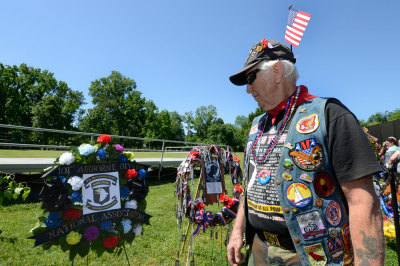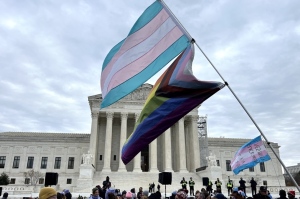Unfinished business from Vietnam

This Sunday, April 30th, marks one of the most somber anniversaries in the long history of the American people. On April 30, 1975, the Republic of South Vietnam formally surrendered to the North Vietnamese, thus ending the long and bitterly contested war in Vietnam—at least from the American perspective.
For those tens of millions of Americans who lived through the American experience of the war in Vietnam, it was almost without exception an excruciating and life-shaping experience. This was certainly true for the Baby Boomers (born 1946-1965), the leading edge of which bore the brunt of direct military service in Vietnam. Of course, it also impacted their parents’ generation and the younger generation, which included both their younger siblings as well as many of their offspring.
The nature of the war in Vietnam was fundamentally different than previous wars fought by America in the 20th century. In Vietnam, the combat burden fell disproportionately on working-class Whites, Blacks, and Hispanics who were draftees into the military.
American involvement in the Vietnam War became horrendously divisive at home and it resulted in a rending of the social fabric of the nation in ways which have still not fully healed (and I fear never will) for millions of Boomers as well as for many of their parents, pro and con the war.
When John Kerry, a Vietnam veteran who turned into a leader of “Vietnam Veterans Against the War,” ran as the Democrat nominee for President in 2004, a group of his fellow “Swift Boat” Veterans mounted a campaign against Kerry and his having turned against the war. One morning that autumn of 2004, my wife asked me, “Will Vietnam ever be over for us?”
I replied, “No, because everyone felt betrayed, conservative and liberal alike. The government lied to all of us, and people we know, people that were our friends and classmates, were maimed or died. I fear we will be throwing our dentures at each other in the nursing homes and assisted living facilities in our final years.”
I was born in 1946. The year I turned 18 and registered for the military draft, 1964, was the same year President Johnson sent 500,000 troops to Vietnam. I grew up in a blue-collar, working-class neighborhood in Houston, Texas, and a disproportionate number of my classmates, teammates, and boyhood friends were drafted to serve in the war. Two of them were in my kindergarten class through twelfth grade and graduation. They were both killed in action before their 21st birthday.
I think about my friends. I thought about them when I realized this anniversary was approaching and when I decided to pen this column. I thought about them when I got married. I thought about them when I had each of my three children, when I celebrated my 25th and 50th wedding anniversaries. They never experienced the joys of any of these occasions.
So how should we go forward? The perpetual blame game of the pro-war and anti-war activism have produced bitterness, recrimination and misunderstanding.
We at least now have the perspective and understanding provided by history. From 1964 to 1968 the American Army followed a strategy formulated and applied by Washington and General William Westmoreland. Essentially, this involved American forces fighting the war for the South Vietnamese in large-scale “search and destroy” missions, while neglecting training and equipping the South Vietnamese military. There was little understanding of “the struggle for hearts and minds.”
At the beginning of 1969, when General Creighton Abrams replaced Westmoreland after the election of Richard Nixon, “Vietnamization” became the priority. America gradually drew her combat forces down to minimal levels while equipping and training the South Vietnamese military with the best equipment available. During Abrams’ command (1969-1973), the number of American combat soldiers in Vietnam dropped from just under 500,000 to approximately 47,000.
The result was the signing of the Paris Peace Accords on January 27, 1973. When the Communists mounted a major offensive that spring in violation of the Peace Treaty, the South Vietnamese, aided by American air support, were able to fight off the invasion and continue to defend themselves.
However, American resolve faltered. In the wake of Watergate and the election of large Democrat majorities in both the Senate and the House of Representatives in the 1974 elections, Congress voted to withdraw (over President Ford’s veto) virtually all military aide to our former South Vietnamese allies. The following spring (1975) the South Vietnamese’s defunded military collapsed under the weight of the North Vietnamese’s military onslaught.
So what do we do now? Where do we go from here? First, we need to apologize to our soldiers, sailors, and airmen who served in the war and did their duty. With very few exceptions, they fought honorably and well. They never lost a battle. And yet, when they came home they were denigrated and defiled, spit upon, and called “war criminals” and “baby killers!”
Our Vietnam veterans deserved better. And they still feel the deep wounds of being not welcomed home from war as they should have been. This was brought home to me in a new and deeper way by experiences I had during the first and second Gulf Wars.
I observed soldiers being thanked, applauded, and honored as they went through airports I was travelling through. I noticed men of Vietnam veteran age observing these congratulations wistfully. I went over and asked if they had served in Vietnam. When they answered affirmatively, I thanked them for their service and told them, “I hope you know you have the gratitude of a grateful nation.”
Their response was quite emotional.
This scene has been repeated scores of times since then in all sorts of locales. The last time was actually at the incomparable Vietnam Memorial in Washington, D.C. I watched a Vietnam veteran (his age and uniform garments clearly identified him as such) and he was explaining to his two grandsons the panel of the wall which clearly contained the names of fallen comrades.
He actually hugged me when I thanked him for his service.
Whether you were for the war or opposed it, let’s agree to agree that the soldiers did their duty. They deserve our respect and gratitude. They deserve the welcome parade they never received. Pretty soon it will be too late. They will have passed off the scene. When you see them, thank them. Suggest to your friends and neighbors they be honored at the next local Memorial or Veterans Day parade.
It will help heal a deep and unhealed wound. And it will be the right thing to do.
Dr. Richard Land, BA (Princeton, magna cum laude); D.Phil. (Oxford); Th.M (New Orleans Seminary). Dr. Land served as President of Southern Evangelical Seminary from July 2013 until July 2021. Upon his retirement, he was honored as President Emeritus and he continues to serve as an Adjunct Professor of Theology & Ethics. Dr. Land previously served as President of the Southern Baptist Convention's Ethics & Religious Liberty Commission (1988-2013) where he was also honored as President Emeritus upon his retirement. Dr. Land has also served as an Executive Editor and columnist for The Christian Post since 2011.
Dr. Land explores many timely and critical topics in his daily radio feature, “Bringing Every Thought Captive,” and in his weekly column for CP.




























